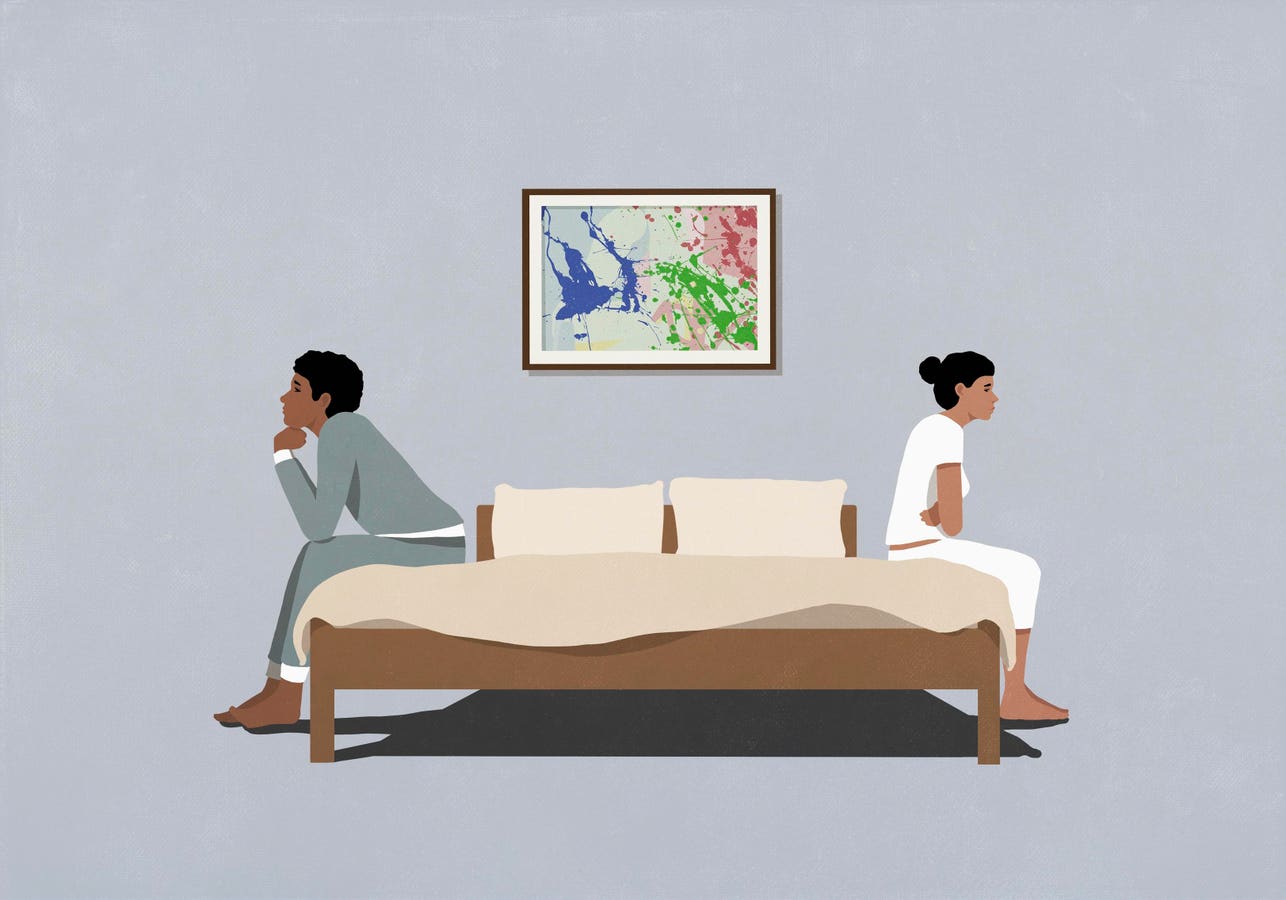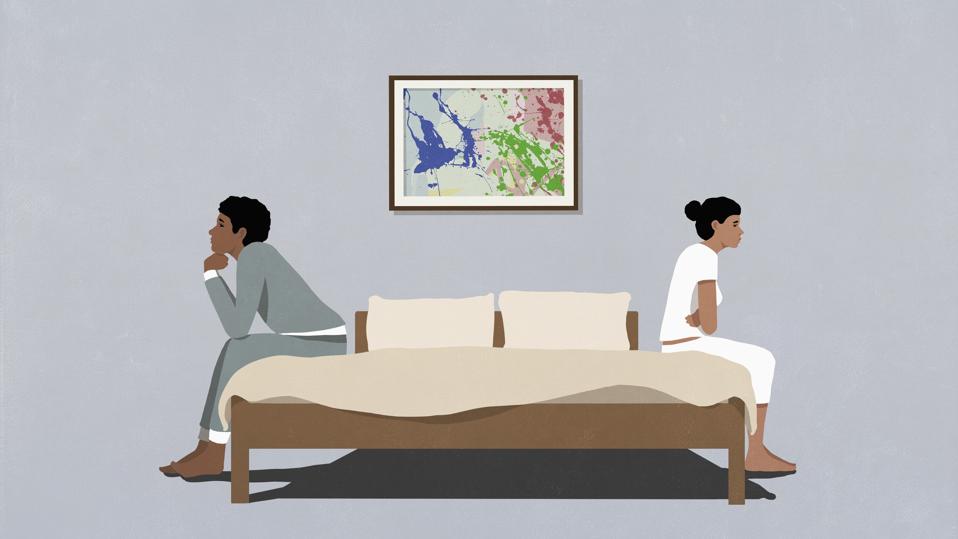When a fight leaves you hopeless and your relationship feels like it’s falling apart, these three steps can help you come back even stronger than before.
getty
Imagine arguing with your partner so intensely that you end up leaving the house altogether. Both sides are reeling after the initial conflict. The blow hits so hard that recovery feels impossible. “This is the last time,” you hear yourself saying. “No more second chances,” you remind yourself.
Perhaps it was a misunderstanding blown out of proportion. Perhaps it was bad timing and a bad mood coalescing. Or maybe, it was simply too many things simmering under the surface until they finally boiled over. Whatever the reason, you had an ugly fight, one where things that shouldn’t be said were said, where anger took hold more than love did. And now that the fog has cleared, all you want to do is make up.
All relationships go through ugly fights, or at least moments of tension that feel difficult to move on from. They’re inevitable, often caused by incompatible communication styles, and they tend to show up most at the beginning of a fledgling relationship — when you’re just starting to truly discover one another, and find that who your partner is may contradict your idea of them.
However, this doesn’t necessarily mean you were wrong about each other, just that your understanding of one another must evolve with time. As uncomfortable as fights can be, they often help you achieve exactly that.
Here are three research-backed ways to bounce back from ugly fights in your relationship and create an even stronger connection.
1. Take A Cooling-Off Period
When partners fight ugly, they often say things they don’t mean; things they know will hurt their partner deeply, yet say them anyway. When their honesty and vulnerability are used against them and reciprocated in kind, it creates a divide that may seem impossible to bridge. When emotions run high, so does conflict, and that is exactly why taking time off becomes essential.
A cool-off period with the intention to reconnect later helps both partners calm their reactivity and slowly turn towards clarity. When repair is rushed too soon, it creates even more distance. The other partner may raise walls or grow distant and defensive, which only worsens the conflict.
Taking some time apart gives both sides the safe space they need to process their feelings and a fighting chance to save the relationship.
A 2011 study looked at the capacity of couples to recover and “cool down” after a fight, and it discovered that couples who were able to detach and reset after disagreements eventually had healthier, more stable relationships.
Even those with insecure attachment styles would greatly benefit if their partner was good at cooling down and re-establishing peace after a conflict. Here’s how couples can cool off healthily after an ugly fight:
- Discuss it in advance. Establish that regardless of how angry an argument becomes, either one of you can request a break.
- Discuss the length of the break. Before the situation gets out of hand, determine how much space you both normally require. It may be 10-30 minutes, an hour or two, or even the remainder of the day.
What matters most is that you both feel good about when you’ll come back and talk things out with a clearer mind, rather than avoiding the issue entirely or creating suspense and fear around its resolution.
2. Practice Honest Reflection
In a 2016 study published in the Journal of Social and Personal Relationships, researchers observed 100 couples and specifically examined their behaviors in the moments after a conflict.
They found that when a partner engaged in “recovery sabotage,” defined as holding onto grievances, rehashing the argument or continuing negative interactions after the conflict, these behaviors had a negative impact on the relationship. This predicted lower relationship satisfaction and more instability over time.
Recovery sabotage wasn’t related to how partners expressed emotions during the conflict itself; instead, it was closely tied to whether grievances were voiced or suppressed.
When you take a step back, it’s important to think constructively about the conflict. This is where perspective-taking helps. Putting yourself in your partner’s shoes to understand how they may have felt can help you see where their concerns are really coming from.
Here are some ways to regulate your emotions instead of ruminating about them the next time you get into an ugly fight:
- When you take time to cool off, reflect honestly about what really caused the fight, and not who was right or how they wronged you.
- Try to address the root issues, not just the surface-level conflict. Ugly fights are often caused when something deeper or fundamental in the relationship needs to be addressed. It’s rarely about a one-time issue. It likely highlights a pattern, rather than just a misunderstanding.
- Stay transparent about your feelings, and admit when you’re wrong. Show up with empathy, not defensiveness. Try to understand and listen to your partner, rather than trying to defend or explain yourself.
Never forget that it’s not “me vs you,” it’s “us vs the problem.” Even in the middle of chaos, show up as a team.
3. Have A Closing Conversation
When you have ugly fights, make sure everything you and your partner feel is brought into the open and no grievances are left suppressed. Revisit the matter again if either of you feels like there’s something more you need to add or talk about.
Openly discuss everything that was said, how it made each partner feel and why they said what they said — even the hurtful things — as this allows both partners to understand each other better and heal together.
Saying, “I’m sorry I intentionally said things that hurt you. I was in so much pain and I just wanted to lash out,” is not only a human thing to do, but also a brave one. It gives your partner the closure they may need to move on from the conflict.
Knowing with certainty that what was said wasn’t meant or true, but came from a place of hurt, helps release resentment.
It’s equally important to decide how to move forward and handle similar issues in the future. This is where you discuss your triggers and boundaries that shouldn’t be crossed, as well as what each partner might need to work on. It’s also crucial to make each other feel heard and validated so future escalation can be prevented.
Having closure after ugly fights is necessary. It not only helps both partners move forward but also builds intimacy and trust because it invites vulnerability. It opens up a meaningful dialogue and adds a layer of depth to the relationship, making it more resilient and long-lasting.
Wondering if you and your partner fall into destructive arguing patterns? Take the science-backed Ineffective Arguing Inventory to find out.









